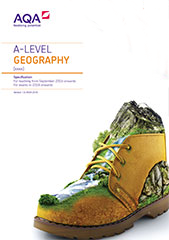Scheme of assessment
Find past papers and mark schemes, and specimen papers for new courses, on our website at aqa.org.uk/pastpapers
This specification is designed to be taken over two years.
This is a linear qualification. In order to achieve the award, students must complete all assessments at the end of the course and in the same series.
A-level exams and certification for this specification are available for the first time in May/June 2018 and then every May/June for the life of the specification.
All materials are available in English only.
Our A-level exams in Geography include questions that allow students to demonstrate their ability to:
- draw together their skills, knowledge and understanding from across the full course of study
- provide extended responses.
For example, Section C of Components 1 and 2 contain extended response questions. An ‘extended response’ is evidence of sufficient length generated to allow students to demonstrate their ability to construct and develop a sustained line of reasoning which is coherent, relevant, substantiated and logically structured.
Aims
Courses based on this specification should encourage students to:
- develop their knowledge of locations, places, processes and environments, at all geographical scales from local to global across the specification as a whole
- develop an in-depth understanding of the selected core and non-core processes in physical and human geography at a range of temporal and spatial scales, and of the concepts which illuminate their significance in a range of locational contexts
- recognise and be able to analyse the complexity of people–environment interactions at all geographical scales, and appreciate how these underpin understanding of some of the key issues facing the world today
- develop their understanding of, and ability to apply, the concepts of place, space, scale and environment, that underpin both the national curriculum and GCSE, including developing a more nuanced understanding of these concepts
- gain understanding of specialised concepts relevant to the core and non-core content. These must include the concepts of causality, systems, equilibrium, feedback, inequality, representation, identity, globalisation, interdependence, mitigation and adaptation, sustainability, risk, resilience and thresholds
- improve their understanding of the ways in which values, attitudes and circumstances have an impact on the relationships between people, place and environment, and develop the knowledge and ability to engage, as citizens, with the questions and issues arising
- become confident and competent in selecting, using and evaluating a range of quantitative and qualitative skills and approaches, (including observing, collecting and analysing geo-located data) and applying them as an integral part of their studies
- understand the fundamental role of fieldwork as a tool to understand and generate new knowledge about the real world, and become skilled at planning, undertaking and evaluating fieldwork in appropriate situations
- apply geographical knowledge, understanding, skills and approaches in a rigorous way to a range of geographical questions and issues, including those identified in fieldwork, recognising both the contributions and limitations of geography
- develop as critical and reflective learners, able to articulate opinions, suggest relevant new ideas and provide evidenced argument in a range of situations.
Assessment objectives
Assessment objectives (AOs) are set by Ofqual and are the same across all A-level Geography specifications and all exam boards.
The exams and non-exam assessment will measure how students have achieved the following assessment objectives.
- AO1: Demonstrate knowledge and understanding of places, environments, concepts, processes, interactions and change, at a variety of scales (30–40%).
- AO2: Apply knowledge and understanding in different contexts to interpret, analyse and evaluate geographical information and issues (30–40%).
- AO3: Use a variety of relevant quantitative, qualitative and fieldwork
skills to:
- investigate geographical questions and issues
- interpret, analyse and evaluate data and evidence
- construct arguments and draw conclusions (20–30%).
Assessment objective weightings for A-level Geography
| Assessment objectives (AOs) | Component weightings (approx %) | Overall weighting (approx %) | ||
|---|---|---|---|---|
| Component 1 | Component 2 | Component 3 | ||
| AO1 | 15 – 20 | 15 – 20 | 0 | 30 – 40 |
| AO2 | 14 – 19 | 14 – 19 | 2 | 30 – 40 |
| AO3 | 1 – 6 | 1 – 6 | 18 | 20 – 30 |
| Overall weighting of components | 40 | 40 | 20 | 100 |
Assessment weightings
The marks awarded on the papers will be scaled to meet the weighting of the components. Students’ final marks will be calculated by adding together the scaled marks for each component. Grade boundaries will be set using this total scaled mark. The scaling and total scaled marks are shown in the table below.
| Component | Maximum raw mark | Scaling factor | Maximum scaled mark |
|---|---|---|---|
| Component 1: Physical geography | 120 | x1 | 120 |
| Component 2: Human geography | 120 | x1 | 120 |
| Component 3: Geographical investigation | 60 | x1 | 60 |
| Total scaled mark: | 300 | ||
